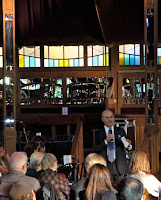Last night I attended the first event in this year's Celebridée speaker series, a talk with Jeremy Rifkin in the spiegeltent (where, last year, I heard a moving speech by Sister Helen Prejean).
I have to say I have somewhat mixed feelings about Rifkin's talk (and I should qualify this by saying I have not yet read his book, The Empathic Civilization: The Race to a Global Consciousness in a World in Crisis). I was surprised to find that, for all the talk of him being a "leading mind," etc., his thoughts last night were a little scattered and, at times, repetitive. I am pleased to report that all three audience questions were quite interesting and thoughtful (this after the host cautioned the audience to ask a question, not make a speech: "we have one invited speaker and you've just heard him"). I actually felt he didn't really address the questions properly, merely repeating past points without really responding to the issues raised.
 Anyway, to back up a bit: Rifkin traced the evolution of human consciousness, from a mythological consciousness, to a theological consciousness, to an ideological consciousness and, in the last century and a half, a national consciousness. His underlying thesis is that this age is now coming to a close, in part because it must - because civilization itself must change in order to survive in a practically climatically doomed world - and that we must embrace a global or "biosphere" consciousness. Writes Rifkin (quoted here since I don't have a copy of the book in front of me), "Only by concerted action that establishes a collective sense of affiliation with the entire biosphere will we have a chance to ensure our future."
Anyway, to back up a bit: Rifkin traced the evolution of human consciousness, from a mythological consciousness, to a theological consciousness, to an ideological consciousness and, in the last century and a half, a national consciousness. His underlying thesis is that this age is now coming to a close, in part because it must - because civilization itself must change in order to survive in a practically climatically doomed world - and that we must embrace a global or "biosphere" consciousness. Writes Rifkin (quoted here since I don't have a copy of the book in front of me), "Only by concerted action that establishes a collective sense of affiliation with the entire biosphere will we have a chance to ensure our future."OK, but I'm not convinced that we will cooperate with the entire biosphere. So far, our response to global warming has been to bury our head in the sand, although Rifkin does inspire with tales of the EU's green efforts and Iceland's Hydrogen Experiment. He is also quite compelling when he appeals to our human emotional response: he spoke at length about babies, and mirrors extending the bonds of empathy and consciousness (in the mirror tent, ha ha!) by allowing us to focus on our similarities rather than our differences. He movingly reminds us that we all ultimately share common ancestors, and that, for many of us, the moments of our lives we most cherish are those when we could connect with others and "feel others as ourselves," suggesting that the empathic human over-rides the rational, self-serving, human.
I just felt he went a bit far, though, and then didn't quite back everything up. He explains the current blowback against an empathic civilization by the rise of xenophobia and intolerance as the last death throes of a dying era (ah, if only I could truly believe that!) He didn't address the question of what happens to the people who, despite a global movement towards an empathic civilization, might resist through violence, hoarding, and so on.
Overall, this was a very interesting evening, and we left still debating about everything. There's no question that we are facing a global crisis, and that the economic crisis is merely a symptom of larger global issues, including the destruction of the environment and a radical change to the biosphere. The question is, will civilization indeed be strong enough, or smart enough, to make the changes we need to in order to survive?
This from a girl whose Honours thesis was about sympathy, and whose blog is called Only Connect. Am I getting cynical?
No comments:
Post a Comment